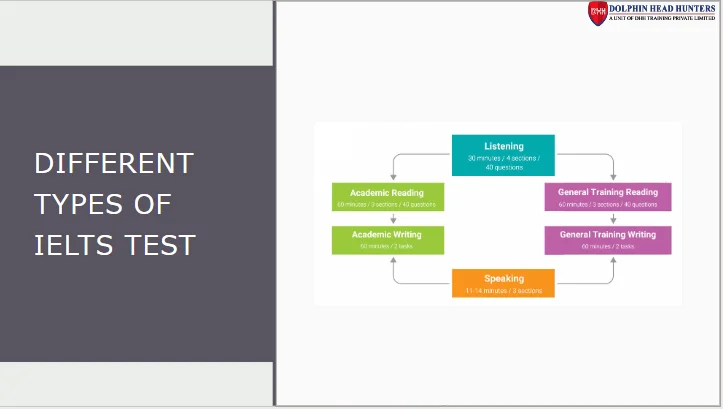Different Types of IELTS Test – The International English Language Testing System (IELTS) is a globally recognized English proficiency test designed to assess your ability to use and understand English in academic, professional, and everyday contexts. Depending on your goals, there are different types of IELTS tests available, each tailored to specific needs. Understanding the differences between these tests can help you choose the one that best suits your requirements. In this blog, we will explore the various types of IELTS tests, their purposes, and how to determine which one is right for you.
What are the Different Types of IELTS Test?
1. IELTS Academic
Purpose: The IELTS Academic test is designed for individuals who are seeking higher education or professional registration in an English-speaking environment. It assesses whether your English proficiency is suitable for an academic or professional context.
Test Format:
- Listening: 40 minutes
- Reading: 60 minutes (includes three long reading passages)
- Writing: 60 minutes (includes two tasks: describing visual information and presenting an argument)
- Speaking: 11-14 minutes (includes an interview with an examiner)
Key Features:
- Content: The IELTS Academic Reading section features texts that are suitable for university-level study. The Writing Task 1 requires you to describe visual information such as charts or graphs, while Task 2 involves writing an essay in response to an argument or problem.
- Focus: The test emphasizes academic language and skills, such as understanding complex texts and articulating academic arguments effectively.
Ideal For:
- University Applicants: Those applying for undergraduate or postgraduate courses at universities in English-speaking countries.
- Professional Registration: Individuals seeking professional registration or licensing in fields such as medicine, engineering, and teaching.
2. IELTS General Training
Purpose: The IELTS General Training test is aimed at individuals who are looking to migrate to an English-speaking country, or gain employment or training in an English-speaking environment. It assesses basic survival skills in social and workplace contexts.
Test Format:
- Listening: 40 minutes
- Reading: 60 minutes (includes three sections with increasing difficulty)
- Writing: 60 minutes (includes two tasks: a letter and an essay)
- Speaking: 11-14 minutes (includes an interview with an examiner)
Key Features:
- Content: The IELTS General Training Reading section includes materials that you might encounter in daily life, such as advertisements, brochures, and newspaper articles. Task 1 in the Writing section requires you to write a letter (e.g., formal, semi-formal, or informal), and Task 2 involves writing an essay on a general topic.
- Focus: The test emphasizes practical language skills needed for everyday communication and workplace interactions.
Ideal For:
- Migration: Individuals applying for immigration to countries such as Australia, Canada, New Zealand, or the UK.
- Employment: Those seeking to work or gain training in English-speaking countries.
- Visa Requirements: Applicants needing to meet language requirements for certain types of visas.
3. IELTS for UKVI
Purpose: The IELTS for UKVI (UK Visas and Immigration) test is specifically designed to meet the UK government’s visa and immigration requirements. It is used for visa applications and immigration purposes in the UK.
Test Format:
- Listening: 40 minutes
- Reading: 60 minutes (includes three long passages)
- Writing: 60 minutes (includes two tasks: a description of visual information and an essay)
- Speaking: 11-14 minutes (includes an interview with an examiner)
Key Features:
- Content: The test format and content are similar to the IELTS Academic and General Training tests, but it is administered in a way that complies with UKVI requirements.
- Focus: The IELTS for UKVI assesses English language skills in the same way as the standard IELTS tests but is specifically tailored for UK immigration purposes.
Ideal For:
- UK Visa Applicants: Individuals applying for a UK visa that requires proof of English proficiency, such as Tier 4 student visas, Tier 2 work visas, or Indefinite Leave to Remain (ILR).
4. IELTS Life Skills
Purpose: The IELTS Life Skills test is designed to assess English language proficiency for those seeking to meet specific UK visa requirements. It focuses on speaking and listening skills only.
Test Format:
- Speaking and Listening: 22 minutes (includes a face-to-face interview with an examiner, and a short speaking and listening test with a partner)
Key Features:
- Content: The test is designed to assess your ability to communicate effectively in everyday situations. It involves listening to and responding to information, as well as discussing various topics with a partner.
- Focus: The IELTS Life Skills test evaluates practical language skills needed for daily life in the UK.
Ideal For:
- UK Visa Requirements: Individuals applying for visas such as the Family of a Settled Person visa, which requires proof of basic English language skills.
- Spouses and Partners: Those seeking to join their partners or family members who are already settled in the UK.
Choosing the Right IELTS Test
Selecting the appropriate IELTS test depends on your individual goals and requirements. Here are some considerations to help you make the right choice:
- Determine Your Purpose:
- Higher Education: Choose IELTS Academic if you are applying for university or higher education courses.
- Migration and Employment: Opt for IELTS General Training if you are seeking to migrate, work, or gain training in an English-speaking country.
- UK Visas: If you need to meet UK immigration requirements, select IELTS for UKVI or IELTS Life Skills, depending on the specific visa category.
- Check Requirements:
- Institution or Visa Requirements: Verify the English language requirements for your target institution, job, or visa. Different organizations and visa categories may have specific test requirements.
- Prepare Accordingly:
- Test Format: Familiarize yourself with the format of the test you choose. Ensure you are well-prepared for the content and types of questions you will encounter.
- Practice with Relevant Materials:
- Practice Tests: Use practice materials and sample questions relevant to the test you plan to take. This helps you become accustomed to the test format and improves your performance.
- Seek Guidance if Needed:
- Professional Advice: If you are unsure which test to take, seek advice from educational consultants, immigration advisors, or IELTS test centers for guidance tailored to your situation.
Conclusion
Understanding the different types of IELTS tests and their specific purposes is essential for achieving your goals and meeting your requirements. Whether you are aiming for higher education, seeking employment, applying for immigration, or meeting specific visa requirements, choosing the right IELTS test is a crucial step in your journey.
By familiarizing yourself with the test formats, preparing effectively, and selecting the appropriate test based on your needs, you can enhance your chances of success and achieve your desired outcomes. Take the time to understand your goals, review the options available, and make a decision to ensure that you can excel the IELTS exam.
Train for IELTS with Dolphin Head Hunters
At Dolphin Head Hunters, we are a well-established training and skills development organization that specializes in providing top-notch preparation programs and services for individuals of all ages, including students and corporate professionals. We offer designs to cater to the unique preferences and choices of each learner.
Our mission is to instill the best values and a holistic approach to skill development. We commit to ensure that our faculty imparts not only knowledge but also essential values to our students. We nurture and reinforce these values through regular training and assessments.
Join Dolphin Head Hunters today! Contact now!
Contact Details
Mobile no. – +91-97807-54465
Email– dhhielts34@gmail.com
FAQs on Different Types of IELTS Test
Q1. What is the eligibility for the IELTS test?
There are no specific eligibility criteria for IELTS examinations. Anyone can take the test regardless of gender, age, nationality, educational background, ethnicity or religion. However, it is not suitable for candidates below 16 years.
Q2. Can I appear for IELTS online from home?
The conducting bodies have introduced the IELTS Indicator test in the wake of the pandemic. With this test, one can sit for the test right from the convenience of their home. However, one needs to have the complete equipment set up asked by the administration.
Q3. How many times can I sit for the IELTS?
There is no restriction on the number of attempts one can make for the IELTS exam. You can take the test as many times until you reach the desired score band. But, you need to register and pay the charges each time you appear for it.
Q4. How long are the scores valid?
IELTS scores are valid for 2 years from the date of the test. After 2 years, the scores will no longer be valid.





